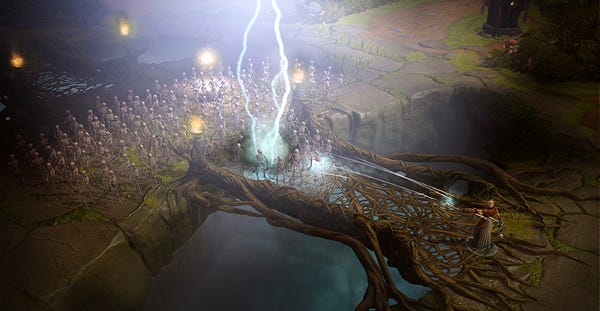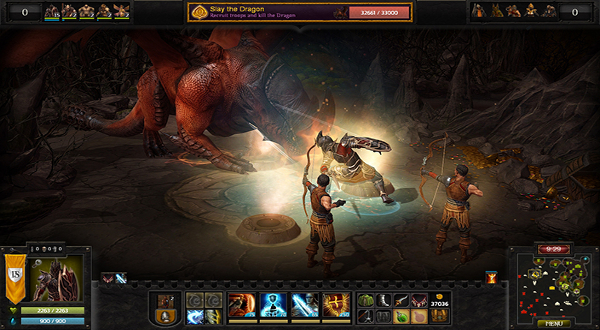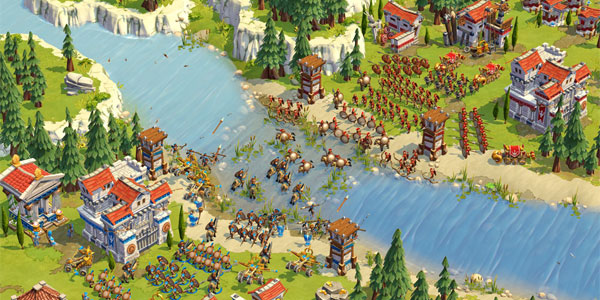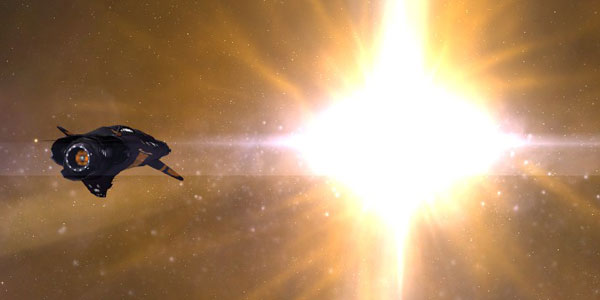Ironclad On Why RTS Is Dying, MOBA Needs To Evolve
Sins Of A Stagnant Empire
In the grand scheme of MOBAs, Ironclad's Sins of a Dark Age is quite the bold thing. AI directors, random rule-rewriting quests, and other RPG-influenced, flow-shattering shenanigans? This certainly isn't DOTA 2.5 or Assortment of Apologues, and it's not trying to be. But at one point, it was doing its damndest to be so much more. Unfortunately, the RTS-style base-building and commanding didn't pan out, and Ironclad scratched them almost entirely. But according to studio director and co-owner Blair Fraser, his MOBA's retching rejection of all things RTS is indicative of much larger problems for both genres. One, he argues, is on its death bed, and the other could be following suit if it doesn't start blazing new trails.
Once upon a time, Ironclad's Sins of a Dark Age was going to be the match made in heaven that many players assumed was simply a foregone conclusion. A MOBA snuggling up in bed alongside an RTS? Well, duh. They grew up next door neighbors, were nearly sweethearts in high school, and spent their uni years making goo-goo eyes from across an increasingly packed campus. So when SODA was announced, everyone's first reaction was "Huh, it's about time." But still, a Commander to rally troops and conduct elaborate, NPC-and-Hero-driven symphonies of slaughter? RTS-style units both aiding heroes and making them feel all the more important by comparison? What's not to like?
Well, quite a lot, as it turns out. Fast forward a couple years, and Sins of a Dark Age is more or less abandoning its RTS side - just as the gaming industry appears to be abandoning the large-scale RTS. But it wasn't supposed to end like this! Not for spicy genre mash-up stews, and not for RTSes as a whole. What happened? Where did it all go wrong? For better or worse, Ironclad director and co-owner Blair Fraser has firsthand experience on both counts.
“We spent probably over a million dollars developing that idea for Sins of a Dark Age," he admitted to RPS, a note of resignation in his voice. "On paper, it sounds brilliant. Oh my god, the meshing of heroes and giant armies! And a commander controlling it all. I was excited by it, and I know we got a lot of response from people, who are now quite upset. But there were fundamental design flaws in the approach.”
"Heroes and Commanders kind of have to be on the same playing field, because an army has to feel effective and a Hero has to feel effective. So, you basically have a lot of power encapsulated in a single avatar, and a Commander has that same power distributed among a number of units. Because the Commander's able to distribute that power to a number of locations, he can gain objectives with a more optimal distribution of power. He only sends what he must to deal with the situation. So the Commander only has to send one or two units to perform a key role. But if a Hero wants to counter that, he has to take 100 percent of his power and walk over there, and spend time cleaning up. It feels really shitty as the Hero to have to make that kind of commitment."
"The equivalent [of a Commander] in our game would've been a Hero that's still an avatar, but also has these global abilities. So basically, a Hero that's better than the other Heroes."
He went on to explain, however, that it works both ways. Heroes, he said, basically render Commanders' tactical options moot because they serve as highly specialized counters to nearly every extreme strategy. "In StarCraft, it's typically an early rush or all-ground or all-air strategy in hopes that the enemy's making another gambit. There's holes to be exploited. In a MOBA, chances are, a number of those holes are already filled [by Heroes]. So it forces the Commander to play a boring middle-of-the-road strategy. The optimum is to always be able to cover a little bit of everything. It's an emergent property we couldn't have seen coming."
Granted, it's not all bad, as SODA's come away with an AI director and sudden, earth-shaking realm events that occasionally creep into RTS territory. For instance, that purple grump of a dragon that just spawned? A blessing in disguise, as you can now claim a few fully commandable RTS-style units to aid your cause. Come to think of it, maybe you don't want to explain the concept of uncles to the beast, teach it proper English, and then take a brief tour into colloquialisms so it can eventually bellow "uncle" in proper context upon defeat, er, at all. If it stays alive, you get to keep your bonus units and employ them however you please. So SODA found its happy middle ground. It just took multiple revamps, one million dollars, and a series of sobering realizations (including this one) to get there.
But there's a bridge between SODA's nasty divorce from RTS and the genre's agonizing final hours, and unfortunately for all involved, it's very much tied to money. Fraser outlined the issue, using Microsoft's recently halted Age of Empires Online as an example.
"I can tell you why Age of Empires Online went out of business. They had to hit a certain price point that F2P players find valuable. The Team Fortress 2 high-five animation was the same price as an entire faction in Age of Empires Online. The return on investment there just doesn't make any sense. And that's why Age of Empires Online isn't generating anymore content, and that's why we're not charging for army-type units [in SODA]."
So we've entered a whole new era for the gaming industry, and RTS is having trouble figuring out how to haul its hulking, easily unbalanced form into greener pastures. But, in all likelihood, that's fixable. Frankly, anything can be monetized - even if it means getting chewed up and spat out by a machine whose iron jaws slaver only for the bottom line. No, transitioning into F2P's only part of the problem. The real elephant in the room, according to Fraser? Stagnation.
"I'm not seeing a lot of what I used to in RTS," he confessed. "I mean, Company of Heroes is now safe with the buyout by Sega. But what have we got here? Company of Heroes 2, StarCraft II, and Age of Empires Online – which is basically shutting down. I don't know how the free-to-play Command & Conquer will turn out. End of Nations is having a bunch of problems."
"RTSes, to my mind, are very niche now. And that's unfortunate, because that's what I love, and that's what I grew up playing, and that's what I make. Or made, anyway. I just think the demographics have changed. Company of Heroes may be profitable, and StarCraft II is an anomaly. But most of them aren't gonna get big numbers."
"It's a dying market."
But then, where does that leave Ironclad's own Sins of a Solar Empire? It is, after all, technically a strategic experience that occurs primarily in real-time. And, while Dark Age went through a dark age of its own, Sins of a Solar Empire kept Ironclad afloat. So what makes the spaced-out star destroyer so special? Well, according to Fraser, it's all part of an unfortunate trend: the further you get from true RTS, the more successful you become.
“Sins of a Solar Empire is still thriving, and it's basically our take on RTS," he noted. "But it's kind of diverged from classic RTS, so it still has a place. It still has a very specific community that wants more. There are games like Total War as well, but they broke away from classic base-building, because that's done. It's sad for me to say, but that's done."
That in mind, the message is clear: evolve or die. And don't think for a second that Fraser doesn't know his company's plotted a course for another genre that's seemingly in no hurry to break truly new ground. But Dark Age is a "Sins" title for a reason. Chip away the Heroes, dragons, and, um, air, and you'll find the exact same strategic spirit.
"We're strategy gamers in the most abstract sense," he said. "We're not beholden to any past [MOBA franchise], so we can just look for what's going to add the most strategy. Sins of a Solar Empire came from the same mindset: how does this change the strategy? And I think there's always a market for that. People want to say, 'Can I be creative to solve this problem?'"
"We are not going for the super high-level play. StarCraft II does that on the RTS side. LoL and DOTA 2 are fighting over that on the MOBA end. So that's not who we're going for. I know there are people like me who want to play in a different way."
Will a MOBA/RPG/slivers of RPS hybrid actually work, though? Can gobs of AI-directed quests and occasional unit commanding slot nicely into the current MOBA mold? Fraser sure hopes so. And he's willing to keep cracking the whip until Ironclad gets it just right. But then, that's not an entirely surprising stance to take when you consider the alternative.
"If genres don't keep evolving, they die," he stated flatly. "And I was seeing not a lot of evolving in the RTS, base-building genre. By extension, I think the MOBA genre has to continue evolving if it's gonna make it past two generations."
Let's see, first there was DOTA, and now LoL/DOTA 2/HoN. So that's one... two... Oh jeez. Looks like it's time to get to work.













